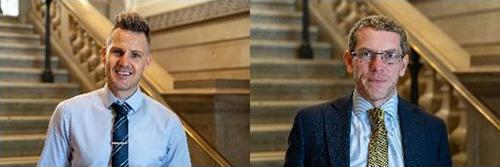An Australian’s perspective: working at the heart of the UK Government’s Counter Fraud Function

Between April and July 2023, Chris McDermott from Australia’s Commonwealth Fraud Prevention Centre (the Centre) was seconded to the UK’s Public Sector Fraud Authority (PSFA). The CEO of the PSFA, Mark Cheeseman, sat down with Chris to reflect on his time working in the centre of the UK’s Counter Fraud Function.
Chris, congratulations on being the inaugural secondee under the International Public Sector Fraud Forum’s new secondment program. What did you expect from the opportunity to work for the PSFA for 3 months?
I had pretty high expectations about what I’d take away from the secondment. You and the team here in the UK have always been a reliable supporter and shining example for us back in Australia. So I knew that being exposed to how you’re now building the PSFA and its different services and functions would give me a lot of valuable innovations and insights to take back and continue to improve our own Centre’s work.
I’m also really proud of what our Centre has delivered since we were established back in 2019 (modelled on the former Counter Fraud Centre of Expertise). And so I was also keen to give back and share some of our own innovations and practices to help the UK public sector and the PSFA continue to modernise its approaches to countering public sector fraud.
What were your initial impressions of the PSFA?
My initial impression was that the PSFA truly is a destination for those wanting to make a difference in fighting public sector fraud. This impression has been confirmed during my secondment as I’ve been fortunate to meet and work alongside the dedicated members of the PSFA across different locations, levels, functions and services. I’ve been inspired by their passion for protecting vital public sector services and functions from fraud. They are the PSFA’s most vital asset and I’m very confident they’re up to the task of delivering its ambitious mission.
Was the PSFA different from what you expected?
There is a lot happening! Expanding the size of the PSFA and creating a range of new services and functions is a complex undertaking. There is also a lot of political interest and support behind the PSFA’s mission, and public sector fraud is more front-of-mind for the British public compared to Australia. This creates a tricky balance for the PSFA in demonstrating impact today while building the longer-term structures for tomorrow. But it also creates opportunities to take important leaps forward towards a modern, more proactive response to fraud.
What do you take away with you back to Australia?
There is so much to be inspired by. As I mentioned before, the UK has always been a great example for us back in Australia and I’ve taken away something from every service and function in the PSFA. Each team plays a critical role in shaping the future of counter fraud in the UK and I’ve already been able to take away what I’ve learned from them to help shape our own approach to countering public sector fraud and corruption back in Australia’s Attorney-General’s Department.
What are some good practices and innovations you’ve shared? Where can we do better?
The reception I’ve had from those I’ve met across the PSFA and UK public sector has been inspiring and also validating for our Centre’s work and approach back in Australia. I’ve shared a range of new ideas and innovations, such as how to use our Fraudster Personas in different ways to strengthen our counter fraud response. The tools and services we deliver in the centre of the Counter Fraud Function need to be business-enabling, and the Fraud Control Testing Framework I’ve developed for the UK public sector is an example of this. It’s designed to help the Counter Fraud Function collaborate with business teams to better identify and understand fraud risk, eliminate blind spots, mitigate fraud in a measurable and cost-effective way, and ultimately enhance operational efficiency and effectiveness.
The Counter Fraud Function also can’t protect public services alone – all civil servants need to play their part. I’ve had the opportunity to share how we communicate fraud in our Centre, and showcased some of the practical guidance using accessible formats, clear narratives and simplified language. The PSFA has an important role in empowering not only the experts, but also mobilising other functions and civil servants, giving them the knowledge and tools they need to be more effective agents in preventing fraud.
Was the join up between the UK and Australian centres good? Should we join up more?
We’ve always been well joined up at the senior levels. Your secondment to Australia in 2019 and our collaboration through the International Public Sector Fraud Forum has helped form and maintain a strong, strategic partnership over the years, culminating in us formalising that partnership in February. However, we need to continue to deepen the working-level connections. Our collaboration on the new Fraud Prevention Standard is a great example of how both nations can benefit from this type of joined-up work. While working with the PSFA I’ve also identified opportunities to join up teams here (and across the Counter Fraud Function) with relevant counterparts back home. It’s these connections that will further enhance and sustain the knowledge sharing and collaboration between the UK and Australia, and realise the full potential of our strategic partnership.

